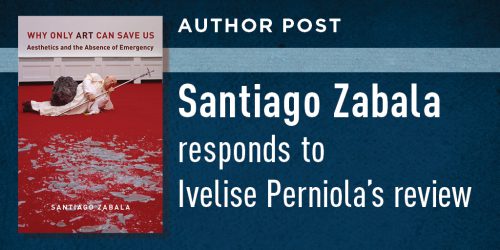Santiago Zabala: A Philosophy for the Occupy Wall Street Movement
“Hermeneutics, then, is one of the few philosophies that reflects the pluralism of our postmodern societies because, like truly democratic procedures, it includes and allows structural changes to take place every time citizens demand them. Ignoring these demands for change overlooks new, different, and vital interpretations and also ignores the 99 per cent of the population that is now demanding them and the change they can effect.”—Santiago Zabala
In his op-ed for Aljazeera on the Occupy Wall Street Movment, Santiago Zabala, most recently the author of Hermeneutic Communism: From Heidegger to Marx, cites Karl Marx’s famous quote from 1845, “Philosophers have only interpreted the world in various ways; the point is to change it.”
Zabala argues that contemporary analytical or metaphysical philosophers such as Robert Nozick, Francis Fukuyama and John Searle are guilty of putting forth philosophies that are “incapable of producing change, those that sustain the current constitution of society, politics and, most of all, the economy.” Opposed to these conservative philosophical methods is hermeneutics, a tradition whose adherents run through history from Aristotle and Augustine to Paul Ricoeur and Hans-Georg Gadamer. Hermeneutics, which relies on an active and autonomous basis for interpreting the world, offers an important philosophical framework for the protestors and for understanding and challenging the status quo.
Zabala concludes by asking, “But why is hermeneutics the most appropriate philosophy for these protesters who seek to change real economic policies?”:
If hermeneutics can become the philosophy of our protesters it is not only because it shares a discredited condition, revolutionary goals or ethical resistance, but also because it suggests that human coexistence is possible without imposed truth, that is, a single global financial system. After all, according to Joseph Stiglitz, Paul Krugman, and other distinguished economists, it is just this belief in a global economy that drove us into financial crisis in the first place. The IMF, WB and ECB are founded on a “pensee unique,” that is, an ideology of perfection, rationality, and self-regulation where flaws, frictions and failures cannot even be taken into consideration. Imposing as truth the specific economic policies of these organizations is to the life embodied by our protesters, a life that shows different and differently vital cultural and economic demands. Hermeneutics, then, is one of the few philosophies that reflects the pluralism of our postmodern societies because, like truly democratic procedures, it includes and allows structural changes to take place every time citizens demand them. Ignoring these demands for change overlooks new, different, and vital interpretations and also ignores the 99 per cent of the population that is now demanding them and the change they can effect.
2 Responses
Leave a Reply
You must be logged in to post a comment.



Please parse this as prose, or if prose as not non-sensical:
Imposing as truth the specific economic policies of these organizations is to the life embodied by our protesters, a life that shows different and differently vital cultural and economic demands.
By “nonsensical” I suppose I mean not either tautological or utterly self-contradictory.